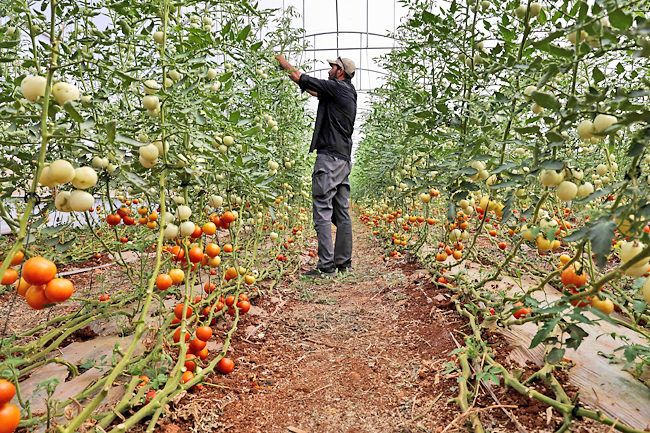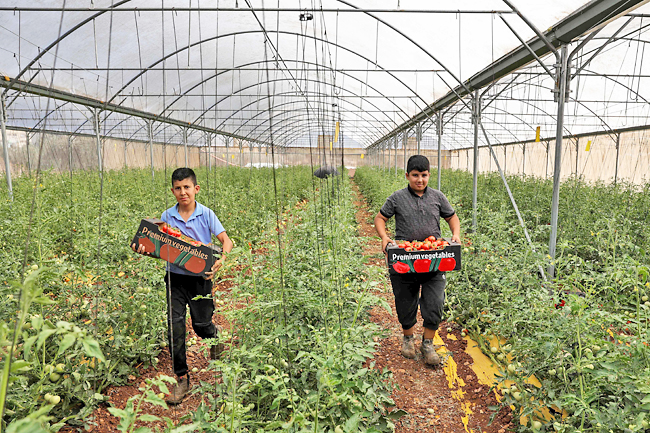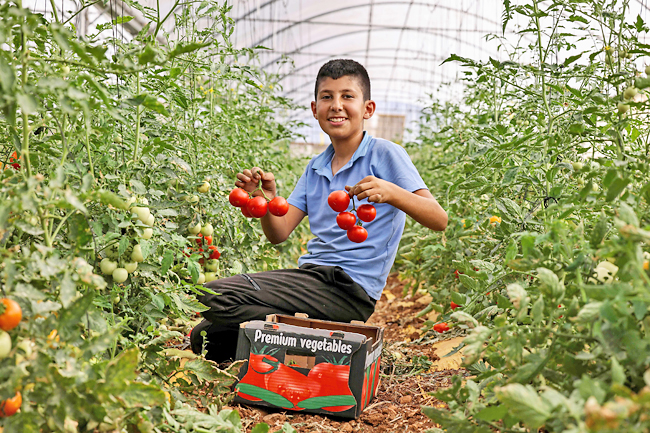PALESTINIAN TERRITORIES (AFP) – Hussein Jamil held a permit to work in Israel for 22 years until the war in Gaza broke out. Now, after setting up a greenhouse in a West Bank village, he swears he’ll never go back.
Harvesting his tomatoes in the occupied West Bank, the 46-year-old said his former Israeli boss has already called several times to ask him to return.
“But I told him that I would never go back to work there,” he said in Bayt Dajan near Nablus, the northern West Bank’s commercial centre.
There, dozens of men have returned to the traditional pursuit of tilling the land, rather than board buses to queue at the heavily guarded checkpoints that lead into Israel.
“It’s a very useful job and above all safer” than working in Israel, said Jamil, as he tends to his plants with his sons.
Israel stopped issuing work permits for Palestinians after the October 7 attack by Hamas, which resulted in the deaths of 1,198 people, mostly civilians, according to an AFP count based on official Israeli data.
Israeli reprisals in Gaza have so far left 39,790 dead, according to the Health Ministry of the Hamas-run territory, which does not give a breakdown of civilians and fighters killed.
Jamil was one of 200,000 Palestinians from the West Bank who were working in Israel legally or illegally, according to the Palestinian General Confederation of Labour, and who lost their livelihoods overnight.




Salaries in Israel are more than double what Palestinians can make in the occupied territories, according to the World Bank.
Many of those workers are now busy in the greenhouses that have sprouted up in recent months on the hillsides where, Palestinian elders said, their ancestors once grew wheat.
Working this way, “we are independent and peaceful”, said Jamil, adding: “It’s much better than working in Israel. Here we work on our land.”
Economic prospects have dived since the war, with West Bank unemployment leaping from 12.9 per cent to 32 per cent in the final three months of 2023.
Some 144,000 jobs have been lost in the territory, many because of rising violence that has prompted the army to block roads, strangling economic activity.
Since October 7, at least 617 Palestinians have been killed in the West Bank by the Israeli army or settlers, according to an AFP count based on official Palestinian data.
At least 18 Israelis, including soldiers, have died in Palestinian attacks in the same period, according to official Israeli data.
Every day, around USD22 million in income is lost in the West Bank, according to International Labor Organization (ILO) estimates.
In Bayt Dajan alone, 300-350 men worked in Israel out of a population of 5,000.
Mazen Abu Jaish, 43, who spent 10 years working in Israel, took his time before deciding to pick up his shovel and rake and set up a tomato greenhouse.
“We waited, thinking that we would get our jobs back again after the war,” he told AFP.
But unlike previous wars in Gaza, which never lasted more than a few weeks, the current conflict is fast approaching its first anniversary.
“So we ended up getting together with 35 other people from the village and we decided to start farming rather than keep waiting,” said Jaish.
Since October 7, 15 hectares of Bayt Dajan have been covered by greenhouses with tomatoes and cucumbers, grown by people who used to work in Israel, municipal officials said.
Mohammad Ridwan, a member of the municipal council, sees other advantages as well, as the greenhouses are in Area C – the West Bank land controlled solely by Israel, and vulnerable to being used for illegal Israeli settlements.
Area C makes up 59 per cent of the West Bank, and 63 per cent of its agricultural land.
The Norwegian Refugee Council also says that Israel had denied Palestinians access to 99 percent of the land in Area C, in many cases preventing them from growing their own fields there.
“Local unemployed people have found work and above all, we are preserving land in Area C,” said Ridwan.








